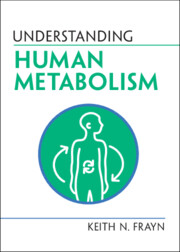Book contents
- Understanding Human Metabolism
- Series page
- Understanding Human Metabolism
- Copyright page
- Reviews
- Contents
- Foreword
- Preface
- Acknowledgements
- 1 What Is Metabolism?
- 2 Metabolic Fuels
- 3 Metabolic Pathways
- 4 Communication Systems in Human Metabolism
- 5 ATP: The Common Currency of Metabolic Energy
- 6 Metabolism in Daily Life
- 7 Metabolism Is So Adaptable
- 8 Metabolic Interactions between Nutrients
- 9 Metabolic Disorders
- Concluding Remarks: Human Metabolism in Context
- Summary of Common Misunderstandings
- References
- Figure Credits
- Index
1 - What Is Metabolism?
Published online by Cambridge University Press: 25 August 2022
- Understanding Human Metabolism
- Series page
- Understanding Human Metabolism
- Copyright page
- Reviews
- Contents
- Foreword
- Preface
- Acknowledgements
- 1 What Is Metabolism?
- 2 Metabolic Fuels
- 3 Metabolic Pathways
- 4 Communication Systems in Human Metabolism
- 5 ATP: The Common Currency of Metabolic Energy
- 6 Metabolism in Daily Life
- 7 Metabolism Is So Adaptable
- 8 Metabolic Interactions between Nutrients
- 9 Metabolic Disorders
- Concluding Remarks: Human Metabolism in Context
- Summary of Common Misunderstandings
- References
- Figure Credits
- Index
Summary
But the idea that ‘metabolism’ is just concerned with how fast, or slowly, we might burn off excess energy is a very restricted one. A commentator announced recently on the radio that ‘the economy has slowed by 30%’ (as a result of the coronavirus pandemic). I suppose this refers to the Gross Domestic Product, GDP. But I don’t know what things contribute to this, or how they interact and how each is regulated. My wife and I try to buy produce from local shops, thinking we are doing some good for ‘the local economy’. I guess the overall economy is made up of many ‘local economies’, together with other things like, for instance, manufacturing and garbage disposal. If that is so, then there are many parallels with metabolism. I am guessing that my understanding of economics is very similar to most people’s understanding of metabolism. Yes, there are ways of capturing an ‘overall’ figure for a person’s metabolism, but that in turn is made up a myriad of smaller components. And we can’t understand the ‘overall’ picture, let alone how it might change, without having some knowledge of these components that contribute to it.
- Type
- Chapter
- Information
- Understanding Human Metabolism , pp. 1 - 12Publisher: Cambridge University PressPrint publication year: 2022



